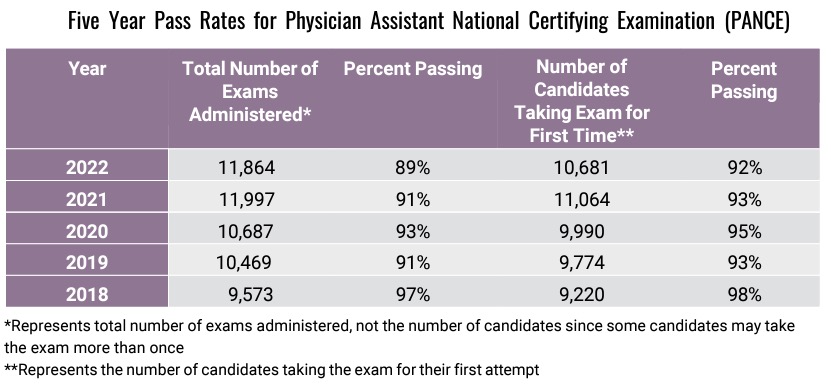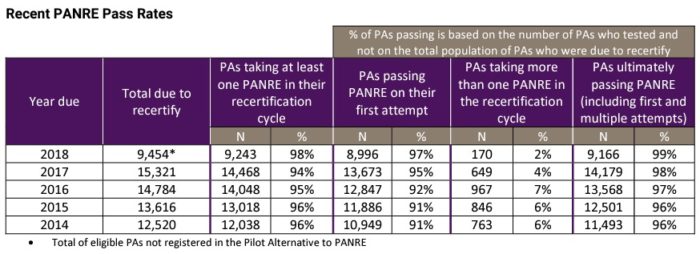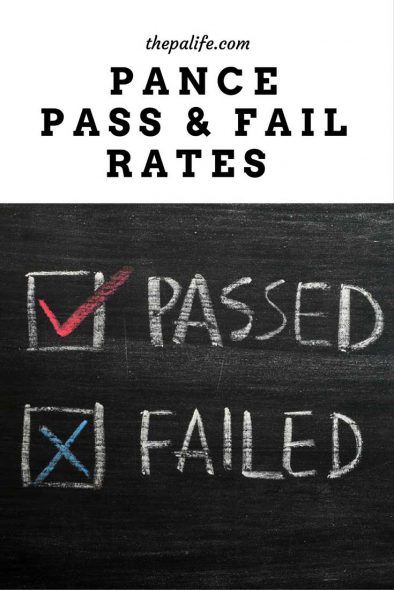The Physician Assistant National Certifying Exam (PANCE) has been in existence since 1973, and as of 2023, over 168,318 people have taken the exam.
In recent years, we have seen some fluctuations in the pass rates, with notable changes following the release of new exam blueprints in 2019.
Historical Perspective on PANCE Pass Rates
Since its inception, the PANCE pass rate has seen fluctuations between 69.0% and 94.6%.
In 2003, there were 5,480 test takers (first-time and repeat), with an overall pass rate of 80%. By 2016, the number of certifying examinations administered had risen to 8,631, with 8,025 achieving certification. The failure rate in 2016 was less than 4%, and only 549 candidates were unsuccessful. In 2018 the failure rate was less than 2%.
These numbers indicate a positive trend, with more individuals becoming certified and a decreasing failure rate over time. However, changes in exam blueprints and other factors have introduced some volatility in recent years.

Recent Changes in PANCE Pass Rates
In April 2019, the National Commission on Certification of Physician Assistants (NCCPA) announced that the PANCE pass rates had dropped from 98% to 93% after the release of the newest PANCE Blueprint.
In 2020, we saw a slight increase in the pass rate to 95%. However, 2021 saw a decrease back to 93%, and new data reported that the pass rate dropped further to 92% in 2022.
It's important to note that these fluctuations are relatively minor, and the pass rate remains high. However, the downward trend in the last two years is something to keep an eye on.
Current PANCE Pass Rates (through 2022)

How about the PANRE? Current PANRE Pass Rates

Intriguingly, the most recent data available from the NCCPA for the Physician Assistant National Recertifying Examination (PANRE) only extends through 2018, demonstrating a first-time pass rate of an impressive 97%. This exhibits a positive trajectory since 2014 when the first-time pass rate was a more modest 91%.
The most encouraging news lies in the ultimate success of PAs in passing their PANRE (if requiring more than one attempt). This has increased from 96% to an outstanding 99%! This increasing trend exemplifies the dedicated efforts of the NCCPA and the determination of PAs in their pursuit of recertification.
Looking Forward
As of the time of updating this article, the specific pass and failure rates for 2023 are not yet available. The NCCPA is the primary source for this information, and I recommend checking their official website or contacting them directly for the most recent and accurate data.
While we wait for the 2023 data, it's crucial for aspiring PAs to remain focused on their studies and exam preparation. Remember, the key to success on the PANCE is a strong foundational knowledge of the medical sciences, good clinical reasoning skills, and diligent preparation.
We will continue to monitor these trends and provide updates as more data becomes available. Stay tuned for the latest information on PANCE pass and failure rates.
Resources:
- PANCE and PANRE Blueprint Review: Smarty PANCE
- PA School Finder - Sort PA Schools by 5-Year PANCE Pass Rate
Related Posts:
















I am comparing average enrollment, graduation, with average initial test takers. The information here is appreciated! Do you know of any data on average enrollment, or more practically class size per school?
Hi, Travis, you can compare schools on many different variables including class site using my PA program picker: https://www.thepalife.com/pa-program-picker/
Also, you can search geographically and compare most schools on my companion website at https://www.paschoolfinder.com/
Let me know if you have any more questions!
Stephen
I think we need complain to our Gov in every state. One this doesn’t prove anything about our medical knowledge or ability. I have been in medicine for years. One thing people need to understand. Our NCCPA Pres and the person that is in charge of this test, she hasn’t seen a patient herself in over ten years. No wonder her tests are worthless. She probably doesn’t know how to pull out a splinter. She hasn’t taken care of a patient in 10 years. This means she can’t write a test and medical knowledge unless she deeps in texts at the library.
Second,I called the NCCPA and complained about the test. It was interesting what I was told by the NCCPA. They thought about getting rid of the test. But TOO many companies were filing the NCCPA law suits becaiuse all the pre test books seminars were filing suits against them forthe loss of their income and losing money and filing suits against NCCPA from all the prep businesses for the tests. So the NCCPA kept the tests so they would not have to go to court and quiet all the law suits.
I have been told the NCCPA is a non profit organization and they are broke. Lets look at the math here >8k tests divide 6-10 years and 350 per tests plus failure rates. My math tells me they aren’t broke
I sat for the PANRE last Friday. I have practiced 35 years in occupational and family practice. I truly agree the exam leaves you wondering what was that test all about? The world of academia needs to get in touch with the real world of of medicine. The questions are directed at never seen diseases. Never seen in most careers.
Hi James, I think the NCCPA and AAPA agree as well. I am pretty sure we will start seeing the current PANRE phased out over the next 10-20 years. They are already testing a new model (which I am not sold is any better) but you are certainly not alone in your feelings. I am eager to see what happens.
Stephen
Rosh Review is hands down the best review I bought. I bought so many books, Davis, Oconnell, Hippo Pance Review and Rosh Review. Rosh Review questions were longer and gave a better explanation also seemed harder. It helped me get better on my time because their questions are so long. After I did all of the 1720 HIPPO test questions twice, I did all 3000 Rosh Review questions twice and then Reread Oconnell last. I was able to pic out topics in the Oconnell book that I didnt think were important when I read it the first time. I can say that Rosh Review was the reason I Passed the Pance and “Aced” two sections. When I took the PANCE I was able to identify what I was dealing with and eliminate 2 BS answers right off the bat. FYI the questions in the O’connell Book and PA easy are super simple and the PANCE is nothing like that. I would Highly recommend doing a whole bunch of questions before the PANCE, so you get better at test taking. I used a good test taking technique and it worked, 1) Read Answers first, 2) Read last question, 3) Read entire question, 4) Eliminate 2 wrong answers. Doing alot of questions over and over helped me get my time down.
This is good advice Pedro, I have also heard very good things about the Rosh Review Program.
Hi,
I failed PANCE twice and going to attempt my third one by sept 20th. I scored 315. I don’t know what i haven’t done to prepare. Did kaplan question bank, 5 day review course, online kaplan review course and cert & recert book. I need serious advices and evaluation. Please help.
200 multiple choice questions every day for 3 weeks (exam master test bank) with answers to why you missed The questions will surely make you pass. Trust me practice and experience makes perfect
what is the % required to pass, with a 240 bank and a score of 379 and up is passing what is that? 70% 75% 80%. I can find this answer no where.
Hi Jodi. At 65 I sat for my PANRE last week. My last recertification was 2009. I failed. Pretty bummed. I did prepare but came up with 351. Nearly had a panic attack.. feeling a little better. ( found out this morning) First exam I failed since 1984
I totally agree. Just sat for my exam today. Second recertification exam in past 12 years. So much obscure and zebra type questions. Seems like I was guessing on a third of the test. Hopefully there will be a large curve because I like my job
It appears that the NCCPA is in agreement as well! Looks like this will probably be the last time you (and I) will have to sit for this type of exam as the PANRE is going to be getting a big update come 2018. Yeeehaaa!!! I am rooting for you, I’m sure you did great.
Stephen
I took the PANRE for the 5th time today in my 30 year career after studying the 3 books they recommend and took a 5 day course. Maybe 20% was relevant and I am not sure I passed. I don’t believe it tested my medical abilities but tested obscure disease processes and things I would look up if needed and not memorize. I was very disappointed with this exam and the AAPA for allowing it.
Hi Pete, I don’t think there is a PA on earth who doesn’t feel exactly the same way you do after taking the PANRE. I do see some positive changes happening though (especially the change to a 10 year cycle) that makes me think things will get better in the years to come. But as you said, about 20% of the exam seems relevant, so what exactly is the point of designing a recertification exam in such a way? I am not sure it helps make us better PAs.
Thanks for you comment, and don’t stress too much, I feel like I fail every time I take the exam as well and will bet taking my PANRE later this year for my 2nd time… uggh!
– Stephen
Great information. I’m actually a little surprised that the failure rate is that high. The last statement about the numbers from 2003, are those PANCE and PANRE combined numbers?